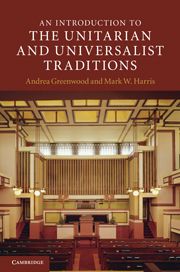Book contents
- Frontmatter
- Contents
- Acknowledgements
- A note on names
- Chapter 1 Introduction
- Chapter 2 Beginnings
- Chapter 3 Great Britain
- Chapter 4 From revelation to reason
- Chapter 5 From reason to intuition to freedom
- Chapter 6 A religion for one world
- Chapter 7 Congregational polity
- Chapter 8 Worship
- Chapter 9 Sources of faith
- Chapter 10 Science and ecology
- Chapter 11 Architecture, art, and music
- Chapter 12 Education and social justice
- Chapter 13 Current issues, new directions
- Selected bibliography
- Index
- References
Chapter 12 - Education and social justice
Published online by Cambridge University Press: 05 June 2012
- Frontmatter
- Contents
- Acknowledgements
- A note on names
- Chapter 1 Introduction
- Chapter 2 Beginnings
- Chapter 3 Great Britain
- Chapter 4 From revelation to reason
- Chapter 5 From reason to intuition to freedom
- Chapter 6 A religion for one world
- Chapter 7 Congregational polity
- Chapter 8 Worship
- Chapter 9 Sources of faith
- Chapter 10 Science and ecology
- Chapter 11 Architecture, art, and music
- Chapter 12 Education and social justice
- Chapter 13 Current issues, new directions
- Selected bibliography
- Index
- References
Summary
In a Unitarian Universalist setting, “education” is embodied in three distinct ways: congregationally, through religious education programs; associationally, through theological schools and the credentialing process for clergy and religious educators; and culturally, through an understanding of the purpose and goals of secular education. The irony of a trinity of forms is furthered by the fact that it is the secular understanding of education that has the most effect within the faith, and to which the largest contributions have been made. The reasons for this are varied, being deeply connected to both rational dissent and social reform, and part of the difficulty Unitarian Universalists have had in providing a cogent explanation of exactly what is “religious” about their religious education. Unitarians and Unitarian Universalists have been criticized for believing in “salvation by education”; for practicing social work in place of religious mission; for having little or no religious content in their educational curricula; and for promoting their own religious convictions through public school curricula. It is hard to believe that all these charges could be true, especially simultaneously! However, the small truths in each of these criticisms coalesce to form a deeply engaged, unified faith. The fact that religious education can look secular is not a sign of intellectual disinterest, but an important aspect of the practice of Unitarian Universalism.
- Type
- Chapter
- Information
- An Introduction to the Unitarian and Universalist Traditions , pp. 214 - 234Publisher: Cambridge University PressPrint publication year: 2011

